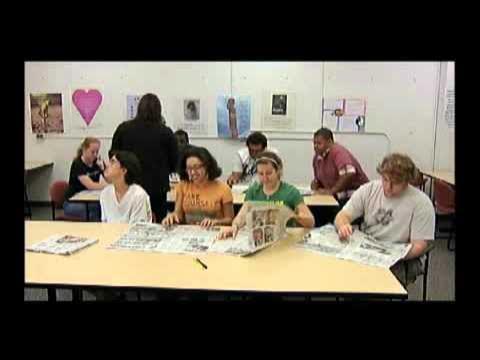Teacher Labs: Making Professional Development Collaborative
Summary
TLDRThis video highlights the power of teacher collaboration through 'teacher labs,' where educators observe and reflect on each other's classroom practices. Focused on student engagement, the sessions allow teachers to share strategies and feedback in a supportive, non-judgmental environment. The goal is to enhance teaching techniques, foster professional growth, and ultimately improve student learning outcomes. Teachers engage in open discussions, observe lessons, and offer constructive feedback, with an emphasis on collaboration, self-reflection, and continuous improvement. The process builds a community of learners dedicated to growth and excellence in education.
Takeaways
- 😀 Teachers benefit from collaborative learning and reflection in Teacher Labs, which ultimately enhances both their own professional development and student outcomes.
- 😀 Teacher Labs foster a community of learners, where teachers collaborate to improve their teaching strategies and share knowledge with one another.
- 😀 Student engagement is a central focus of Teacher Labs, especially in fostering meaningful student discourse and interaction during lessons.
- 😀 Collaborative problem-solving is encouraged, allowing students to work together to solve complex problems and explain their reasoning.
- 😀 Teachers observe each other’s lessons to gather insights into student engagement, participation, and problem-solving methods.
- 😀 The post-lesson reflection provides teachers with valuable feedback, starting with positive observations before discussing areas for improvement.
- 😀 Teacher Labs allow teachers to step outside their comfort zones, observing different teaching styles and adopting new strategies for their classrooms.
- 😀 Teachers are encouraged to focus on developing student communication skills, especially in justifying and explaining their solutions during problem-solving tasks.
- 😀 The feedback process during Teacher Labs is constructive and celebratory, highlighting both successes and areas for improvement.
- 😀 Teachers leave each Teacher Lab session with actionable strategies and new ideas to implement in their own classrooms, contributing to their ongoing growth.
Q & A
What is the primary purpose of teacher labs, as discussed in the script?
-The primary purpose of teacher labs is to foster teacher collaboration, reflection, and growth. Teachers come together to observe each other's teaching practices, provide feedback, and share strategies to improve student engagement and learning outcomes.
How does teacher collaboration in the lab benefit both the host teacher and the observers?
-Teacher collaboration benefits both the host teacher and the observers by providing a platform for feedback and reflection. The host teacher gains insights on their teaching methods and areas for improvement, while observers learn new strategies and gain fresh perspectives that they can apply in their own classrooms.
What specific aspect of student engagement is the focus of the teacher lab in this session?
-The specific aspect of student engagement being focused on in this session is student talk, or meaningful student discourse. Teachers are aiming to enhance how students communicate with each other during problem-solving and collaborative learning activities.
What role does the instructional specialist play during a teacher lab session?
-The instructional specialist facilitates the teacher lab session by guiding teachers through a structured protocol. They help set the focus of the session and ensure that the observations and discussions are aligned with the goals of teacher growth and student engagement.
How does the process of observing a lesson work in a teacher lab?
-In a teacher lab, teachers first review the host teacher's lesson goals and objectives. Observers then watch the lesson being taught, focusing on specific areas such as student engagement, problem-solving, and communication. They take notes on what they see, particularly on how students interact with the task and each other.
What kind of feedback do teachers provide during the post-lesson discussion?
-During the post-lesson discussion, teachers share both positive feedback and wonderings. They first celebrate the effective strategies and student behaviors they observed, such as the use of math vocabulary or constructive student discussions. They then ask questions or suggest areas for improvement, such as how to further enhance student engagement or clarify specific teaching strategies.
What was one of the key takeaways from the session for Valerie, the host teacher?
-One of Valerie's key takeaways from the session was the need to support students in justifying their answers and explaining their solutions. She recognized the importance of providing students with examples to help them develop these skills.
What is the 'red light strategy' mentioned during the teacher lab?
-The 'red light strategy' is a teaching method that Valerie introduced, which she learned from a summer training. While not fully explained in the transcript, it seems to be a strategy designed to enhance student engagement or communication during lessons.
Why do teachers in the lab write down questions or wonderings after the observation?
-Teachers write down questions or wonderings after the observation to facilitate deeper reflection and discussion. These questions help the group analyze the lesson critically and consider ways to refine teaching strategies or further engage students.
What is the importance of stepping outside one's comfort zone during teacher labs, as mentioned in the script?
-Stepping outside one's comfort zone is important in teacher labs because it allows teachers to try new strategies, receive constructive feedback, and grow professionally. Teacher labs provide a supportive environment where teachers can experiment and take risks, knowing that they will be supported by their peers.
Outlines

Esta sección está disponible solo para usuarios con suscripción. Por favor, mejora tu plan para acceder a esta parte.
Mejorar ahoraMindmap

Esta sección está disponible solo para usuarios con suscripción. Por favor, mejora tu plan para acceder a esta parte.
Mejorar ahoraKeywords

Esta sección está disponible solo para usuarios con suscripción. Por favor, mejora tu plan para acceder a esta parte.
Mejorar ahoraHighlights

Esta sección está disponible solo para usuarios con suscripción. Por favor, mejora tu plan para acceder a esta parte.
Mejorar ahoraTranscripts

Esta sección está disponible solo para usuarios con suscripción. Por favor, mejora tu plan para acceder a esta parte.
Mejorar ahora5.0 / 5 (0 votes)






